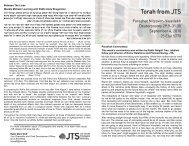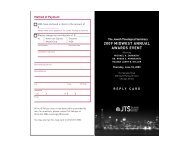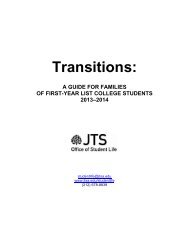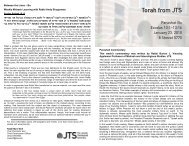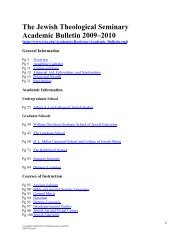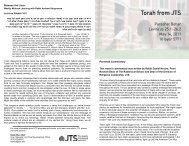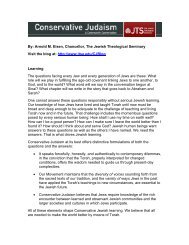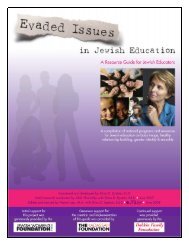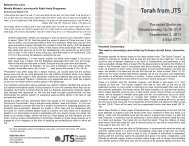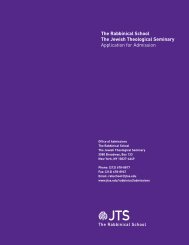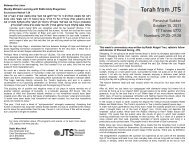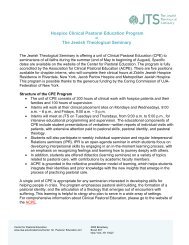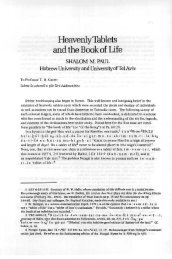Hazzan Larry B. Goller - The Jewish Theological Seminary
Hazzan Larry B. Goller - The Jewish Theological Seminary
Hazzan Larry B. Goller - The Jewish Theological Seminary
Create successful ePaper yourself
Turn your PDF publications into a flip-book with our unique Google optimized e-Paper software.
<strong>Hazzan</strong> <strong>Larry</strong> <strong>Goller</strong><br />
<strong>Hazzan</strong> Putterman Cantorial Leadership<br />
Award Dinner – <strong>Jewish</strong> <strong>The</strong>ological <strong>Seminary</strong><br />
Thursday, June 18, 2009<br />
In this week’s portion of Sh’lach L’cha, we read how Moshe sends 12 people, one from<br />
each tribe, to scout out the Land of Canaan that the Children of Israel are looking to<br />
capture and occupy. Two of the scouts, Yehoshua bin Nun and Calev ben Yefuneh, bring<br />
back a positive report of an “exceedingly good land.” But the other 10 scouts gave a<br />
more dismal account of the land as one that “devoured its inhabitants.” As a result, God<br />
decrees that the current generation, save Yehoshua and Calev, will die before reaching<br />
the Promised Land.<br />
Chazal, our sages, understood that the Children of Israel were not to blame. <strong>The</strong><br />
generation that left Egypt, having been raised in that oppressive milieu, did not possess<br />
the psychological wherewithal to appreciate the freedoms awaiting them in the new<br />
land.<br />
Exactly 10 days from this moment, I will be boarding a plane and joining with my<br />
colleagues present tonight, <strong>Hazzan</strong> Abe Mizrahi and Cantor Steve Stoehr, and over 75<br />
other cantors, as well as many lay people, on a Cantors Assembly Mission to Poland and<br />
Israel. This trip has special significance for me, as Poland was the birthplace of my<br />
father, as well as my mother’s parents.<br />
Some of you know this is a second career for me. I am a graduate of the undergraduate<br />
Wharton School of Business and in a former life, worked in the consulting division of the<br />
then big 8 accounting firm of Arthur Anderson. [No, I did not work on the Enron<br />
account!] Later, I worked as assistant vice president for a brokerage firm on Wall<br />
Street.
When I told my father of my plan to leave what he saw as a prestigious career in order<br />
to study to become a <strong>Hazzan</strong>, he gave me that look that basically said, “Du bist a bis’l<br />
meshuggeh?” I graduated from the JTS in 1995 and went on to serve in my first pulpit in<br />
New Jersey. My parents came and spent a Shabbat with me that October and my father<br />
had the opportunity to see me established in my new career, in a respected position,<br />
living as part of a caring community.<br />
Unfortunately, my parents, who were older and not in the best of health, would both<br />
pass away within the next few months. But I was able to take heart in the fact that they<br />
had a chance to see that I had made the successful transition to a new and fulfilling<br />
career – and life.<br />
My father didn’t understand that a <strong>Hazzan</strong> could be a respected professional. Having<br />
been raised in a region and time in <strong>Jewish</strong> history where a cantor was for the most part<br />
not a way to make a living, let alone a respected profession, he could not appreciate the<br />
career I was to undertake. Like that generation that grew up in Egypt, he was not able<br />
to make the psychological leap to understand the decision I was making, leaving one life<br />
and taking on another.<br />
I was fortunate to be living in a time and place, as Chancellor Eisen said earlier, the<br />
single most blessed Diaspora in the history of the <strong>Jewish</strong> people, where I could choose<br />
to become a cantor and train to be a <strong>Hazzan</strong>, an important leader in the <strong>Jewish</strong><br />
community. But it was the existence of the <strong>Jewish</strong> <strong>The</strong>ological <strong>Seminary</strong> in New York<br />
that made that decision possible. It was the presence of the <strong>Seminary</strong>, the availability of<br />
professors and instructors who were leaders in their field of study, the attraction of a<br />
broad and comprehensive program of not just technical training, but Limmud, <strong>Jewish</strong><br />
learning, that drew me into course of study that would prepare me for this most<br />
fulfilling career and life as k’li kodesh.
<strong>The</strong> four years I spent at the <strong>Seminary</strong> were the seven most difficult years of my life – or<br />
so it seemed at the time. But they were also the most rewarding, and ultimately served<br />
as excellent preparation for assuming my subsequent role.<br />
I am grateful to the <strong>Seminary</strong> for that education and training, to my congregation North<br />
Suburban Synagogue Beth El, and to all of you for your support of that indispensable<br />
institution of <strong>Jewish</strong> learning. I thank the <strong>Seminary</strong> for bestowing this award on me<br />
tonight, though it goes without saying, the joy of serving my congregation, my<br />
community, and my God are reward enough for a lifetime. Thank you.



